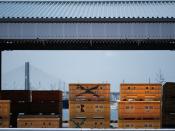Japan's occupation of Manchuria was a major factor leading to World War II. Japan was running out of land, had few valuable natural resources, and was politically unstable. These factors, along with many others, led Japan to become more aggressive, in order to take more land, and to be more jealous of the larger powers. This caused many problems, and would eventually lead to World War II.
Japan, in the early 1920s to 1930s, was a country filled with social discontent, economic struggles, and an unstable government. Because of this, the Japanese military launched a new phase of political expansion on the Asian continent in the early 1930s. Their primary objective was to protect Japan's existing treaty rights and interests in Manchuria and other regions of China against a new, more aggressive Chinese nationalist movement. Because the Chinese nationalists cooperated for a time with the Chinese Communist Party, many Japanese military leaders feared an alliance between a radicalized China and the Union of Soviet Socialist Republics.
Others saw Japan's expansion into Manchuria as a way of dealing with economic crisis and rural distress in Japan. Huge areas of underdeveloped land in the region offered opportunities for Japanese farmers, and its natural resources could supply raw materials, such as iron ore and coal, for Japanese industry.
To set this expansion plan into action, the Japanese needed an excuse to invade. After the Russo-Japanese War, Japan replaced Russia as the most powerful foreign nation in Southern Manchuria. By the late 1920s the Japanese feared that unification of China under the Kuomintang party would put Japanese interests in Manchuria in danger. This view was proved correct when the Manchurian general Chang Hsüeh-liang, who had recently defected to the Kuomintang, refused to halt construction of railway and harbor facilities, referring Japan to...


